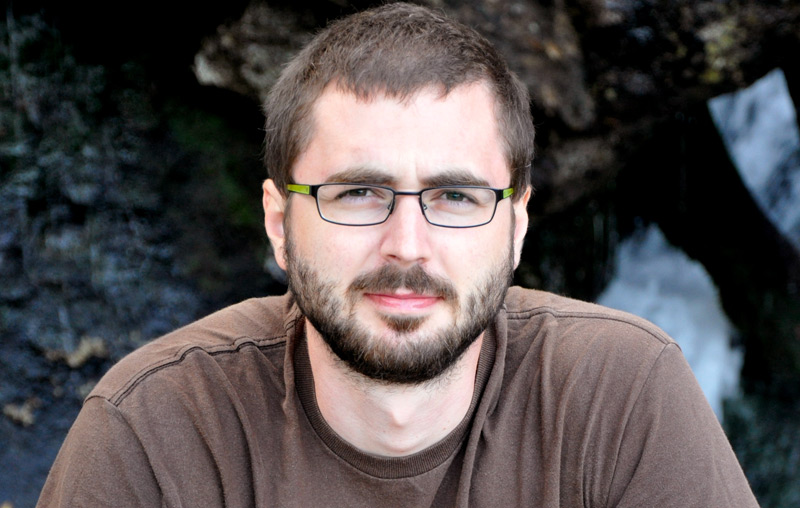about the production
It takes quite a courage to produce The Notebook. When the novel by Agota Kristof came out in Paris in 1986, it became an immediate bestseller. Even though the entire post-Communist generation was raised on this cult piece, the novel has been virtually unknown in Slovakia.
The courage of Daniel Majling, the author of the dramatization and the young director Ján Luterán, is essentially based in having brought to the urban, largely conformist audience, a brisk language by Kristof that is without ornaments, a rough story full of extreme situation on the edge of vulgarity and sexual perversion.
The Notebook is a diary record written by twin’s boys during war. The young boys are intelligent. In the immoral society full of cruelty and violence they soon realise that, if they want to survive, they have to learn to the tough against pain, tenderness and even maternal love. They practice sturdiness of spirit, toughness of body, cruelty, blindness and deafness...
The connection with the theme of empathy comes across in the production in multiple layers. Empathy as association with the situation of defenceless children exposed to ruthless historical events (similarly to the Kristof’s approach, the place and time of the story remain hidden). Yet we cannot prevent ourselves from thinking of the nearby Ukraine or the lives of children in ghettoes. We examine our comfort- able life, the upbringing of our “spoiled” children who would
be unlike to survive a day in similar circumstances... At the same time, we reflect the notion of empathy from the opposite side: we realise that we understand too well. We understand the man who act beastly, stripping himself of any remaining signs of humanity. By rationalising and analysing his conducts we are willing not only to forgive and demean his misdemeanours, but also “sympathise with him” on his path to cruelty. The theme of empathy comes across in the production as controversial at least in the position of natural and rationalised humanity.
The authors of The Notebook production managed to give Slovak theatre a precise and well-crafted piece filled with focused acting mastery, brisk yet an explanatory scenography, emotive and experimental sound layer.
This “piece” is bound to get stuck with the audience. May there be more similar theatrical experiences in our brick institutions.
Iveta Ditte Jurčová, Michal Ditte
“The dramaturge Daniel Majling was more au fait with the transcription of the novel master to stage, in which he retained the obvious roughness, even savagery in the natural openness. The leitmotif of death and/or dying has become the key point to the makers, as is the tabooed eroticism that represented of one the additional forms of human instinct turned wild by the element of war. The director mostly themed the permanent transitions of the characters from earthly life to the afterlife.
The gloomy tuned production by Ján Luterán with the clever light design has given currency to the constant, universal themes of life and death in the world of war. He interpreted the abruptness of the master by Agota Kristof pragmatically and naturally harshly in the form of ceremonial lyricism. The young director thus found an opportunity open to grasp the novel in its laconism. The dramatic shortcut worked here to benefit the expression of the overall cruelty of war that resonated in multiple tones of pain.”
The Pain of Leaving (Miroslav Ballay, Pravda daily, 27. 5. 2015)
“It has been long time that such a drama piece has been produced that, without various musical, costume and scenographic accessories, would be able to keep audience hold their breath for two hours. The first to mention is dramaturge and the author of the dramatization Daniel Majling, in other words his dream-come-true, and then the text by Agota Kristof that speaks of war without undue elements and ornaments, directly and cruelly, yet by precisely naming the reality. (...)
The third person to participate in the production of The Note- book was director Ján Luterán. He managed to accommodate to the abruptness of the text, even to highlight it by simple stage and the grey costumes. Whilst highlighting some sequences, he used theatrical metaphors what removed the directness and superficiality of the statement.”
Marta Žilková, Radio DEVÍN
creators
directed by Ján Luterán
dramaturgy: Daniel Majling
translation: Andrea Čerňanská-Černáková
set design: Michal Lošonský
light design: Ján Ptačin kostýmy / costumes: Eva Kleinová
characters and cast: Grand Mother: Žofia Martišová, Twin 1: Martin Šalacha, Twin 2: Marián Viskup, Mother, Harelip, Maid: Alena Pajtinková, Father, Doggie, Shoemaker, Investigator: Martin Nahálka, Pastor, Officer, Postman: Juraj Ďuriš
director

Ján Luterán (1984, Košice) studied directing at the Academy of Performing Arts in Bratislava under the tutelage of Prof. Ľubomír Vajdička. His work has been influenced by his scholarship stay at the KALD DAMU in Prague where he met the American director Anne Bogart and became acquainted with her acting training Viewpoints. He works with theatres across Slovakia and leans towards new drama and original productions. Those are, at times, often of cabaret nature, and sometimes contain a strong socio-critical accent. Selected works: Once Upon a Time There Was a Class, The Boss of It Hill? (DAB Nitra), Causa bonasus (theatre At the Platform/Na peróne), Jánošík 007 (City Theatre Žilina; Special Award by the Jury at the 2013 New Drama Festival, nomination for the Discovery of the Year at Kremnické gagy), Europeana (Slovak Chamber Theatre, Martin; shown at the 2014 Divadelná Nitra). Within The Ten Commandments production (Slovak National Theatre, Bratislava, the Grand Prix at the 2015 New Drama Festival) he directed the third commandment. His original production project.wedding was guest performed at a number of Slovak and Czech festivals and received the Grand Prix at the 2010 New Drama festival.
Materials available
Video of the production: yes
If you are interested in these materials, write to archivy@nitrafest.sk
